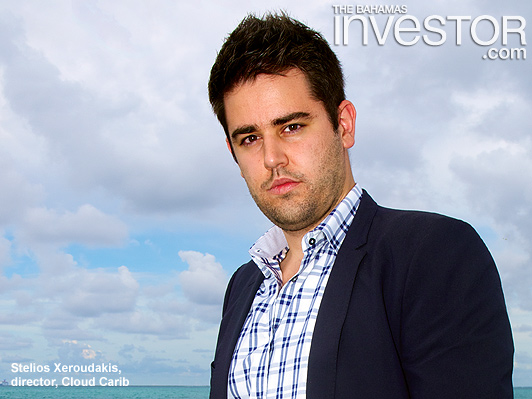| Published: Date: Updated: Author: |
The Bahamas Investor Magazine January 15, 2013 January 15, 2013 Catherine Morris |
 When cloud computing entrepreneur Stelios Xeroudakis began doing business in The Bahamas in 2011, he was surprised to find himself the only one in the marketplace. Since then, his fledgling company, Cloud Carib, has attracted many high profile clients, including the Securities Commission of The Bahamas, Doctors Hospital, the Freeport Container Port and Grand Bahama Power Co—offering them a new way to streamline their IT systems.
When cloud computing entrepreneur Stelios Xeroudakis began doing business in The Bahamas in 2011, he was surprised to find himself the only one in the marketplace. Since then, his fledgling company, Cloud Carib, has attracted many high profile clients, including the Securities Commission of The Bahamas, Doctors Hospital, the Freeport Container Port and Grand Bahama Power Co—offering them a new way to streamline their IT systems.
Xeroudakis, who is Cloud Carib’s director, established the company with two partners: Ryan Austin and Alana Wheaton (pictured). Bahamians Ryan Davies and Noel Johnson came onboard in 2012. The founders are keen to educate the Bahamian business sector in how cloud computing can cut costs, increase efficiency and reduce the burden of data management. “We want to help educate professionals about what is out there,” says Xeroudakis. “How to take simple steps to implement the technology in their day-to-day operations and how to save money.”
What is cloud computing?
Cloud computing is a way of outsourcing everyday computer processes so they are managed by an external operator and delivered to the user as needed. The term “cloud” came from the shape of the diagram IT professionals use to describe Internet circuitry. Industry experts predict that in 10 or 20 years time all businesses will be using the cloud, negating the need for in-house physical servers and other computer hardware.
“The big shift in computing has been from physical servers to virtual servers,” says Xeroudakis. “Now we are at the stage where there are more virtual servers than physical; it is no longer something new. There has been a huge spike [in the technology] and a big paradigm shift.”
Today, the New York Stock Exchange uses cloud computing, along with most of the companies on the Fortune 500. The industry is going from strength to strength, according to Xeroudakis, and Bahamian companies can now reap the benefits of joining the technology revolution.
Software skills
As well as bringing their own skills to the mix, Cloud Carib’s senior management also rely on the expertise of their advisory board. This five-member panel includes Alec Karys, a former senior manager with Amazon.com, and Yannis Kalfoglou, a London-based technologist. The board, whose members also own a share in the company, consults with the founders every two weeks via the cloud and has a face-to-face meeting once a year.
“We wanted people with experience, who would give us advice about strategy,” explains Xeroudakis.
With this kind of experience and knowledge behind the company, Cloud Carib knows its industry. Following its launch in December 2011, the company moved quickly to become certified providers of the leading virtualization software VMware and Citrix.
VMware is a virtualization platform, which enables systems to access and transfer processes to the cloud. Every company on the Fortune 500 uses VMware products and Cloud Carib is the only registered provider of the software in The Bahamas. “VMware is a no-brainer for companies,” says Xeroudakis. “It is the present market leader. It was important to us to associate ourselves with the proven success story.”
In April 2012, the company attained VMware “enterprise” status, meaning that it has demonstrated a high level of expertise, and allowing it to access VMware products, licenses and support services. “It is very difficult to get enterprise status. You have to be highly qualified. You have to prove you have the knowledge to support the customers,” says Xeroudakis.
Cloud Carib is also a certified Silver Solution Advisor with Citrix and hopes to upgrade to gold in the near future. Citrix products currently available through the company include XenDesktop—a service that allows users to access their desktop data from any remote device, anywhere in the world. “You can get your whole desktop on your portable device,” says the Cloud Carib director. “It is very secure and very reliable.”
Finance in the cloud
For financial services providers in an offshore hub such as The Bahamas, communication and confidentiality are key. Cloud computing lowers communication and data storage costs by offloading the burden to an external provider, eliminating the need for equipment, specialized IT staff or maintenance work, and reducing electricity costs. In addition, the virtual servers give businesses the flexibility to grow their operations without further investment, as the capacity can be scaled up at any point to meet demand.
While storing data remotely may appear to put that data at risk, concerns about confidentiality have been pre-empted and met by the cloud computing industry, which
has developed secure networks and tools such as encryption software to ensure information is tightly protected and controlled.
“We want to give [financial providers] the flexibility of cloud computing, at the same time protecting their information in a fully audited environment,” says Xeroudakis, who explains that the software offered by Cloud Carib is rigorous in safeguarding data. “For the financial community we are building IT outsourcing with data protection in mind and all the safeguards in place.”
In October 2012, the company began a pilot project with Weiser Asset Management Ltd, a financial services firm based in Lyford Cay. The firm pays Cloud Carib a monthly fee and in return it operates all their IT systems. The infrastructure needed for the project is hosted by Cable Bahamas.
In the future, Cloud Carib would like to see more financial institutions making use of their services. Founder Xeroudakis says it makes good business sense for companies to sign on to the cloud. “One of the major savings is in efficiency. Companies can see up to 50 per cent increased efficiency from virtualization computing and there are similar figures for power savings.”
Market competition
As The Bahamas joins the cloud computing movement and businesses begin to realize the benefits, Cloud Carib may not be the only provider in the market for long.
This does not deter Xeroudakis, who has big plans for the company’s future. “Competition is healthy. This is capitalism all over the world,” he says. “We want to help bring cloud computing to as many institutions in The Bahamas as we can. We want to prove that we are here to stay, to help educate professionals and be a positive part of the community.”
High on Cloud Carib’s wish list is government. Xeroudakis is keen to work with the various ministries to help them implement more efficient IT systems and reduce their costs.
He is hopeful that the company will work with the public sector in the future, and says it has already been approached by the Royal Bahamas Police Force to work with their IT department.
“We are starting slowly. Cloud computing is just starting to pick up now in The Bahamas and we are serious about supporting the companies here.”










